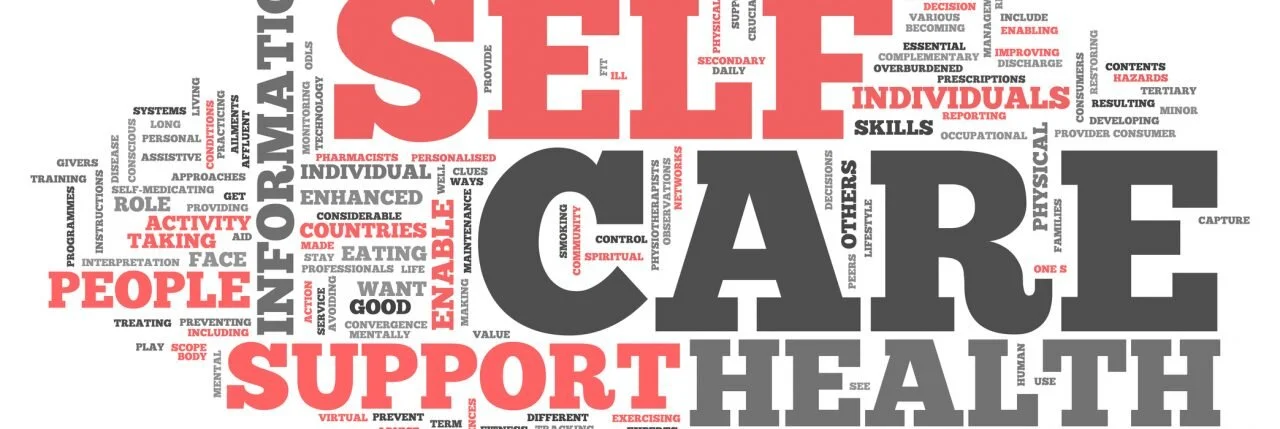The Language of Self-Care
Amid the lexicon of the wellness world, the word “self-care” gets thrown around a lot. And it can mean different things to different people—a bubble bath and glass of wine for some, a mental health break for others. And wrapped up in that cozy blanket term of self-care are a lot of other concepts. At the heart of it all is, well, the self, and doing everything we can to nourish our sense of it. To help you understand more about what really goes into self-care, we’ve created a glossary of related buzzwords for your reading pleasure. Go forth and educate.
Self-care
At its core, self-care is the practice of protecting your own well-being and happiness, particularly during times of stress. It’s about taking action to balance physical and emotional health by knowing your limits and not going over them. It’s also about identifying the things that bring you joy and help you to decompress. And the benefits of self-care range from improving well-being and decreasing morbidity and mortality to reducing healthcare costs. Acts of self-care include basic necessities such as eating well, exercising, getting enough sleep, and relaxation. But really, self-care can be anything that feeds your soul and takes the weight of the world off your shoulders—even for a little while.
Self-compassion
Self-compassion is about treating yourself with kindness, care, support, and empathy in the same way you would treat a good friend who needs you. It’s more of an emotional attitude toward yourself and not a judgement of worth. So even when you aren’t feeling so great about yourself, you’re accepting and kind rather than critical. There’s a connectedness in self-compassion, as well as an understanding that life can be difficult. The long-term effects of self-compassion on daily life include a decrease in depression, increased happiness, increased life satisfaction, and better physical health.
Self-soothing
Just like a baby sucks his thumb for comfort, self-soothing is a type of behavior that is used as a coping mechanism to help you deal with stress. It’s like a simple act of self-comfort that you can do to help calm your mind and body. Self-soothing strategies will differ from person to person, and they are often based on the senses. Maybe it’s a song that makes you happy, a soft blanket that provides comfort to touch, or even a cup of soothing tea.
Self-indulgence
Self-indulgence is defined as excessive self-gratification. It’s about being overly indulgent or permissive with ourselves, and seeking immediate gratification at whatever cost. The danger is, it can combine a false sense of entitlement and a whole lot of hedonism. While every now and then it’s okay to self-indulge (eat that extra dessert, buy the expensive purse, etc.) if self-indulgence is left unchecked, it can lead to negative consequences (over-eating, debt, and even addiction.).
Self-love
Self-love means valuing yourself as a human being, accepting yourself without conditions, and having a high regard for your own well-being by nurturing it physically, psychologically, and spiritually. Self-love isn’t about instant gratification or narcissism. It’s about respecting yourself and knowing you’re worthy of love. Unlike self-compassion, which is something you practice in a given moment, self-love is a life-long state of being. It’s an authentic and honest appreciation for yourself.
Self-awareness
Self-awareness is comprised of two components, an internal self-awareness and an external self-awareness. Internal self-awareness is a monitoring of our internal world—how we see our emotions, strengths, weaknesses, and behaviors. External self-awareness is knowing how other people see us according to those same factors. It’s essentially a measure by which we evaluate and judge ourselves and our actions and act in accordance with our values and standards. Self-awareness can have many benefits such as better decision-making, higher success, and enhanced self-confidence.
Self-preservation
At its core, self-preservation is a protective instinct to act in our own best interest to ensure survival—it’s why fight or flight mode kicks in when the threat of pain or fear strikes. But more often, it manifests as a kind of internal coping mechanism that protects us from unpleasant emotional distress that can occur (in varying degrees) in relationships and in everyday life. It’s about putting yourself first and setting healthy boundaries that create emotional space for the sake of your mental, physical, and spiritual health needs.
While the word “self-care” may seem like some new concept, it’s been around for decades and used to refer to how patients could help treat or manage their illness (especially mental illness or age-related health declines) through diet, exercise, and healthy lifestyle habits. These days the idea is more broad and includes a lot of other self-oriented acts and thoughts.

